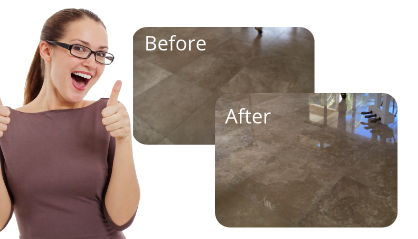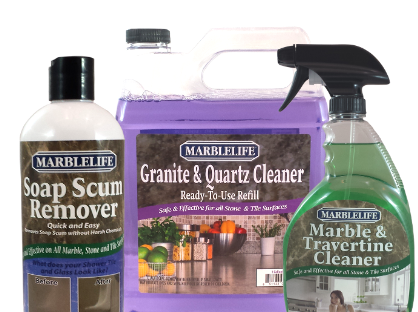In general the following few steps can help protect your natural stone from damages. Below is a list of some simple steps you can take to help protect our natural stone.
Avoiding Etches, Scratches, Burns & Stains
Since acids are the most common cause of damage to natural stone, it is a strong recommendation to keep anything acidic away from your natural stone. For more on etches to natural stone and partial list of things that can cause a damaging etch see the section on About Etches.
Most natural stone is quite hard and resistant to scratches and burns, however they are not impervious to them. Use caution to avoid scratching your natural stone and use a potholder or something safe to put hot items on so as to avoid placing hot items directly on the stone.
Most natural stone does not easily stain, however stains can happen and especially on lighter colored stones. There are many common food and drink items that can stain natural stone. Avoiding contact with them is the first and best step in keeping your stone free from stains. See the section below on Sealing Natural Stone on how and why this is helpful. Below is a partial list of food and beverages that can commonly stain natural stone.
- Coffee
- Tea
- Red wine
- Sports drinks
- Dark fruit and vegetable juices
- Ketchup
- Mustard
- Bar-b-que sauce
- Soy sauce
- Lipstick
- Makeup
- and more…
Careful Cleaning
Be careful in what cleaning products you use and many will actually damage your natural stone. For more on this see the Choosing the Proper Cleaner section. More than just making sure that your cleaner doesn’t damage you stone, is making sure that it is adequately cleaning it. Many popular and even specialty stone cleaners will leave oils and residues behind that can over time stain your natural stone.
Make sure that you are using a cleaner that is safe and actually removing the oils, dirt and residues out from within your stone’s pores. Using a proper cleaner is a very big and commonly missed step in helping keep you natural stone safe.
Sealing Natural Stone
Sealing is highly recommended to help protect against stains and to help make cleaning easier, however, sealing your natural stone with any quality of sealer will NOT protect against etches.
Your natural stone has pores which are very small holes and crevices that can hold oils, grease, dirt and germs. Applying a high quality sealer is filling the open pores with a safe, clean and durable material which blocks out the materials that would otherwise settle into the pores and cause a stain.
Top quality sealers by design will wear off over time. Low traffic areas may only require every few years, where very high traffic areas may require resealing every 6 to 12 months. This is a relatively easy process and is highly recommended to help protect you and your home.
Covering & Containing
Protecting your natural stone with trays, baskets, bins, mats, rugs and runners is simple and very helpful. In bathroom vanities and kitchen countertops, coffee tables and tabletops you can use trays, bins, bowels and baskets to help keep acidic materials off the surfaces. Using doilies and coasters to keep drinks off the stone surface is also recommended. Cup rings from where a drink has ran down the outside of the cup and collected at the base is a very common pattern for etches and stains.
On floors the use of mats, rugs and runners can help keep traffic wear patterns from appearing and collect small spills and dropped acidic food items from damaging the stone floor. The use of mats under animal food and water areas is a good idea as well. Move animal’s eating and drinking areas way from the stone surfaces when possible is also recommended.
Marblelife… Helping Make Your Life Easier



